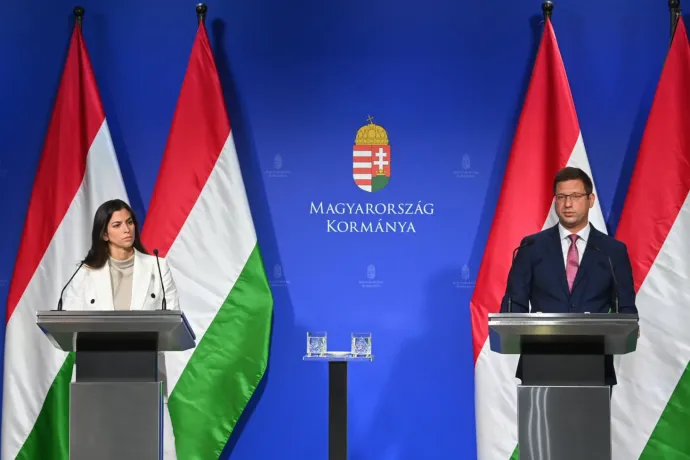
After a one-month break, the Hungarian government's regular, weekly press briefing was held on Thursday by Gergely Gulyás, Minister at the Prime Minister's Office, and Government Spokesperson Alexandra Szentkirályi. Below are the main points addressed.
The Hungarian government would extend the ban on Ukrainian grain imports
Gergely Gulyás said that the wheat situation was among those discussed during Wednesday's government meeting. He explained that the EU's "solidarity corridor" is not a good solution, so it was not by chance that Hungary – along with several other countries – decided to close it. According to the minister, their decision was recognised by the EU, which allowed the suspension of the grain agreement, but only until 15 September. Gulyás said that if the current ban is lifted, it will destroy the Hungarian market, and on top of that, Ukrainian grain is of poorer quality.
Hungary has requested that the ban be extended beyond 16 September, but has not yet received a substantive response from the EU. "We will not make any sacrifices that would put Hungarian agriculture at a disadvantage."
We are a sovereign country, we can invite whoever we see fit
To a question from ATV on why leaders of EU member states were not invited to the 20th August celebrations, and whether Slovakia and Poland are our friends, Gulyás said that of course Slovakia and Poland are our allies. He added that he was happy that the former Austrian Chancellor and the former Slovenian and Czech Prime Ministers were here, and added that we are a sovereign country, and can invite whoever we see fit.
Hungary is looking for contacts with BRICS countries
In response to a question on the government's evaluation of the recent BRICS summit, and on the fact that Iran, Egypt, Saudi Arabia and three smaller countries have now also joined the group, Gulyás said that Argentina and Bolivia have also indicated their intention to join, and India, China, Brazil are already members, which means that the group now represents about 40 percent of the world's population. He said that Hungary is therefore seeking contact with these countries, but added that in the case of Russia this is obviously a special case due to the sanctions.
The government's position on the Russian aggression has always been clear
When asked whether the government shares President Novák's opinion that the war should end with the liberation of Crimea, Gulyás said that the government has always had a clear position on the Russian aggression, and was one of the first to condemn the annexation of Crimea, and this hasn't changed. He added, however, that it was not a question of will whether the war would end with the restoration of the previous state of affairs, but that, unfortunately, what we've seen
in recent decades and centuries is that respect for international law has usually been relative, because it is made so by the stronger players.
The Hungarian government remains in favour of an immediate ceasefire and peace. Gulyás added that the Minsk agreement was reached after the annexation of Crimea, but the reality of whether it is possible to restore international law must always be assessed, and since in his opinion, the Ukrainian offensive is not a success, these things obviously must be taken into consideration.
“Guest workers coming for a specific time is completely different from economic migration”
Several battery factories are being built in the country and there have been many guest workers coming both to build them and to work there. Just last year 81,000 came. In most municipalities, where there is even a suspicion that guest workers will be coming, this immediately generates conflict, so we asked what the government's message is to those who are panicking about this.
According to Gulyás, there are many factories being built in Hungary, not just in one industry, and most of them are being built by Hungarians. There are also guest workers, whose coming to Hungary is very strictly regulated by law, and who can come to places where there are not enough Hungarian workers.
To a question about how this lines up with Prime Minister Orbán's earlier statement that Hungary doesn't want to be a country of immigrants, that economic immigration is also harmful and that we don't want to see a significant difference in cultural background in Hungary, Gulyás said that they still fully agree with this and that their measures are in line with this.
He added that the border is protected by a fence, one can't come in here uncontrolled, but guest workers don't stay here for long anyways, as they only come for a limited period of time through controlled intermediaries to work in specific positions that are not filled.
For more quick, accurate and impartial news from and about Hungary, subscribe to the Telex English newsletter!